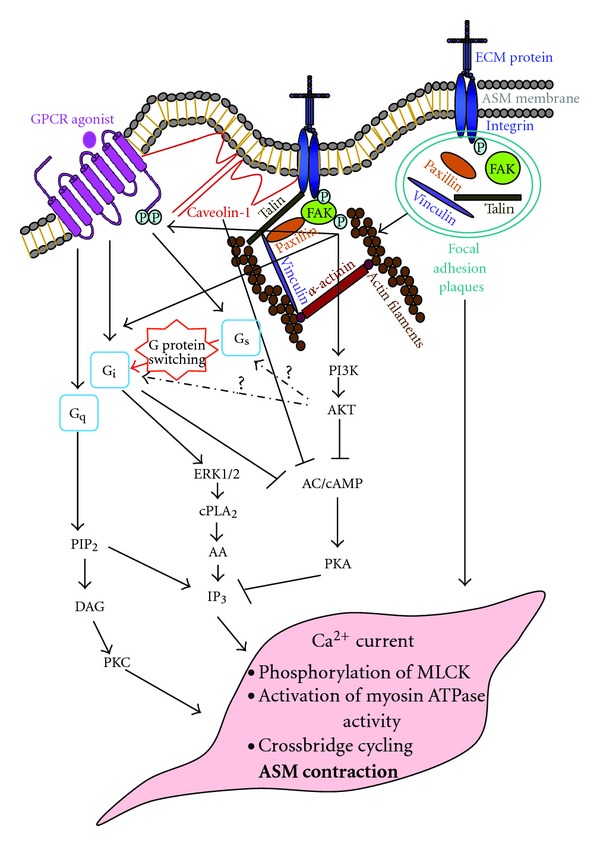Figure 1.

Schematic diagram showing the proposed crosstalk between integrins and GPCRs in ASM cell contraction signaling. Integrin activation is achieved via the formation of focal adhesion plaques leading to cytoskeleton reorganization, which is essential for actin polymerisation and recruitment of linker proteins for tension development. Integrin activation causes the phosphorylation of FAK and activation of downstream signaling events leading to ASM contraction. Integrin activation will also increase intracellular Ca2+ concentration to cause phosphorylation of MLCK and activation of myosin ATPase activity and crossbridge cycling. GPCR-induced ASM contraction signaling can be enhanced either by inhibition of cAMP/AC activity that regulates ASM relaxation signaling, or by activation of Ca2+ current that is necessary for ASM contraction signaling. Activation of integrins can attenuate GPCR-induced AC activity via the FAK/PI3K/Akt pathway. cAMP accumulation and AC activity can be decreased by integrin activation via G protein switching, in which Gi is activated instead of Gs. Altered phosphorylation of GPCR by integrins is thought to underlie G protein switching in ASM cell. Caveolin-1 that binds integrin has been shown to regulate GPCR signaling. Caveolae which are rich in caveolin-1 function as negative regulators of cAMP accumulation in ASM cell. GPCR stimulation of Ca2+ can be enhanced by integrin via inhibition of cAMP/PKA and activation of the Gi/ERK1/2/cPLA2/AA signaling. AA: arachidonic acid; AC: adenyl cyclase; AKT: protein kinase B; ASM: airway smooth muscle; cAMP: cyclic adenosine monophosphate; cPLA2: cytosolic phospholipase A2; DAG: diacylglycerol; ECM: extracellular matrix; ERK1/2: extracellular signal regulated kinase1/2; FAK: focal adhesion kinase; GPCR: G protein-coupled receptor; IP3: inositol 3,4,5-triphosphate; PIP2: phosphoinositol 4,5-bisphosphate; PI3K: phosphatidylinositol 3′-kinase; PKA: protein kinase A; PKC: protein kinas C.
